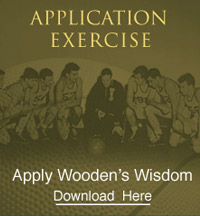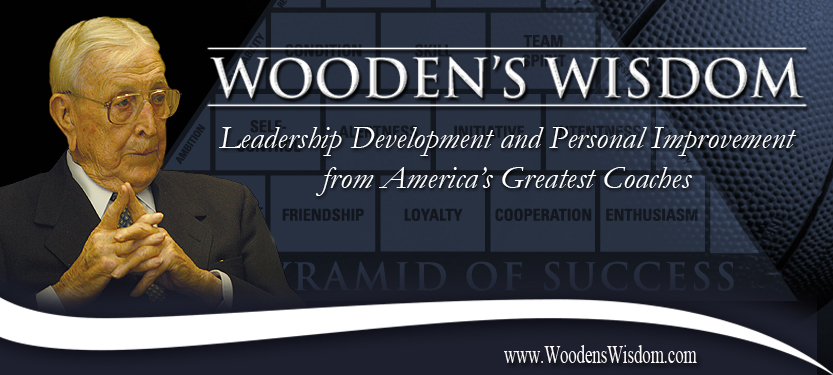|
"DIRECT AND DIPLOMATIC DISCIPLINE"
Coach Wooden was able to discipline his players without alienating them by following these steps.
- He kept his emotions under control. As Coach said: "You cannot antagonize and be a positive influence and you will antagonize when you discipline through emotion."
- He always acknowledged the other person’s point of view.
- He never questioned the other person’s character or intent. He did not use phrases like "you are being irresponsible" or "you don’t care about the team."
- When he stated to the player what the results would be if they did not follow a rule, he did not demand that they follow the rule. He left the choice of what to do up to the player. (This empowered the player to make a proactive decision and maintain their personal dignity.)
In his book "Wooden", Coach Wooden recounts an episode where he had to discipline his great All-American Bill Walton.
"There was a rule against facial hair for players on the UCLA basketball teams. One day Bill Walton came to practice after a ten-day break wearing a beard. I asked him, "Bill, have you forgotten something?"
He replied, "Coach if you mean the beard, I think I should be allowed to wear it. It's my right."
I asked, "Do you believe in that strongly?" He answered, "Yes, I do coach. Very much."
I looked at him and said politely, "Bill, I have a great respect for individuals who stand up for the things in which they believe. I really do. And the team is going to miss you."
Bill went to the locker room and shaved the beard off before practice began. There were no hard feelings. I wasn’t angry and he wasn't mad."
How do you discipline?
Yours in Coaching,
Craig Impelman
|


COACH'S FAVORITE POETRY AND PROSE
Out At Pelletier’s
Out at Pelletier's where the blooded pigeons fly,
An' the tony Shetland ponies romp and play,
Where the peacock on the fence rail hoots at motors chugging by
An' the wolf hounds at the moon (in Russian) bay;
Where the poultry sort o' swaggers in its best bluer-ribbon style,
An' the hogs wear silver buttons in their ears,
It is comfortin' an' soothin' jes' to sit an' rest awhile,
For it brushes back at least a dozen years.
Out at Pelletier's—where old Monte Mark is king,
An' he knows it an' he shows it to 'em all,
Whether rompin' in the pasture, or in trappings for the ring,
Or whinnyin' to greet you in his stall;
An' where Chief, the son of Monte, in a splendid coat of bay
Shows the heritage of vigor in his veins;
It is soothin' an' consolin' to be restin' for a day,
An' forget the city's dismal grind for gains.
It's a lesson in good breedin'—at the farm o' Pelletier's,
It's a lesson in refinement an' in care;
An' it sets a thinkin' feller sort o' thinkin' o' the years
That are waitin' in the future over there.
An' while he's sittin' restin' underneath the walnut tree,
He is thinkin' thoughts perhaps he never speaks;
What's he goin' to leave behind him when his spirit is set free?
Is it money or perfection that he seeks?
Is he strivin' here'for dollars or a better human race,
Just as Pelletier is doin' with his stock?
Would he rather leave a brighter, clearer, smilin' boyish face
Than his name upon a massive building rock?
Is he buildin' here for soundness an' for cleanliness of heart?
Is he breedin' here for happiness or tears?
Oh, it's good for any feller just to take himself apart
An' think the thoughts that come at Pelletier's.
Edgar Albert Guest (1881-1959)
|
